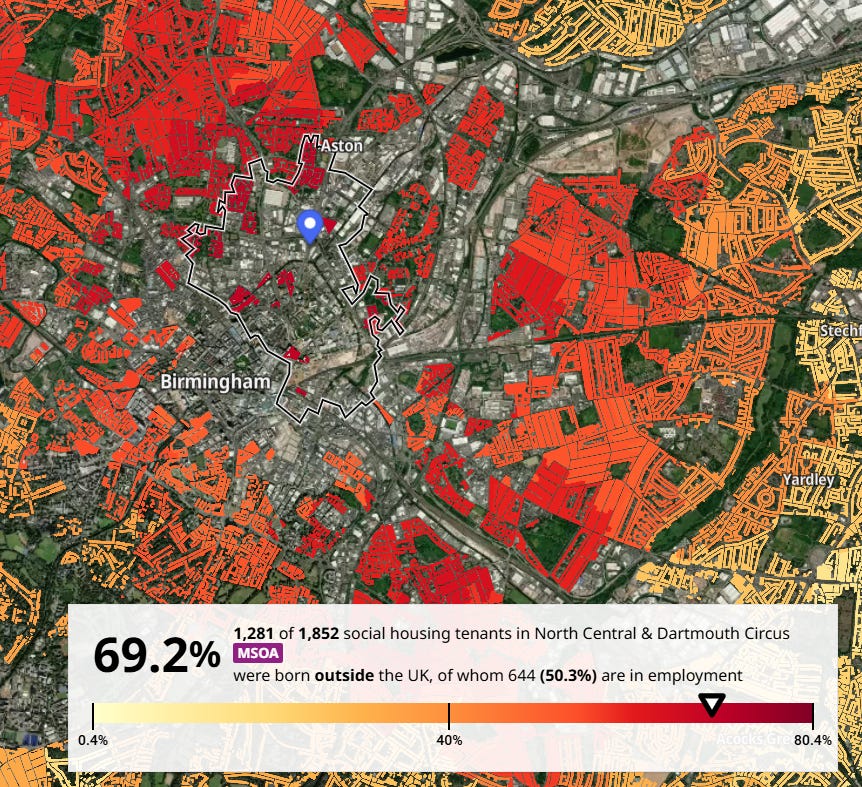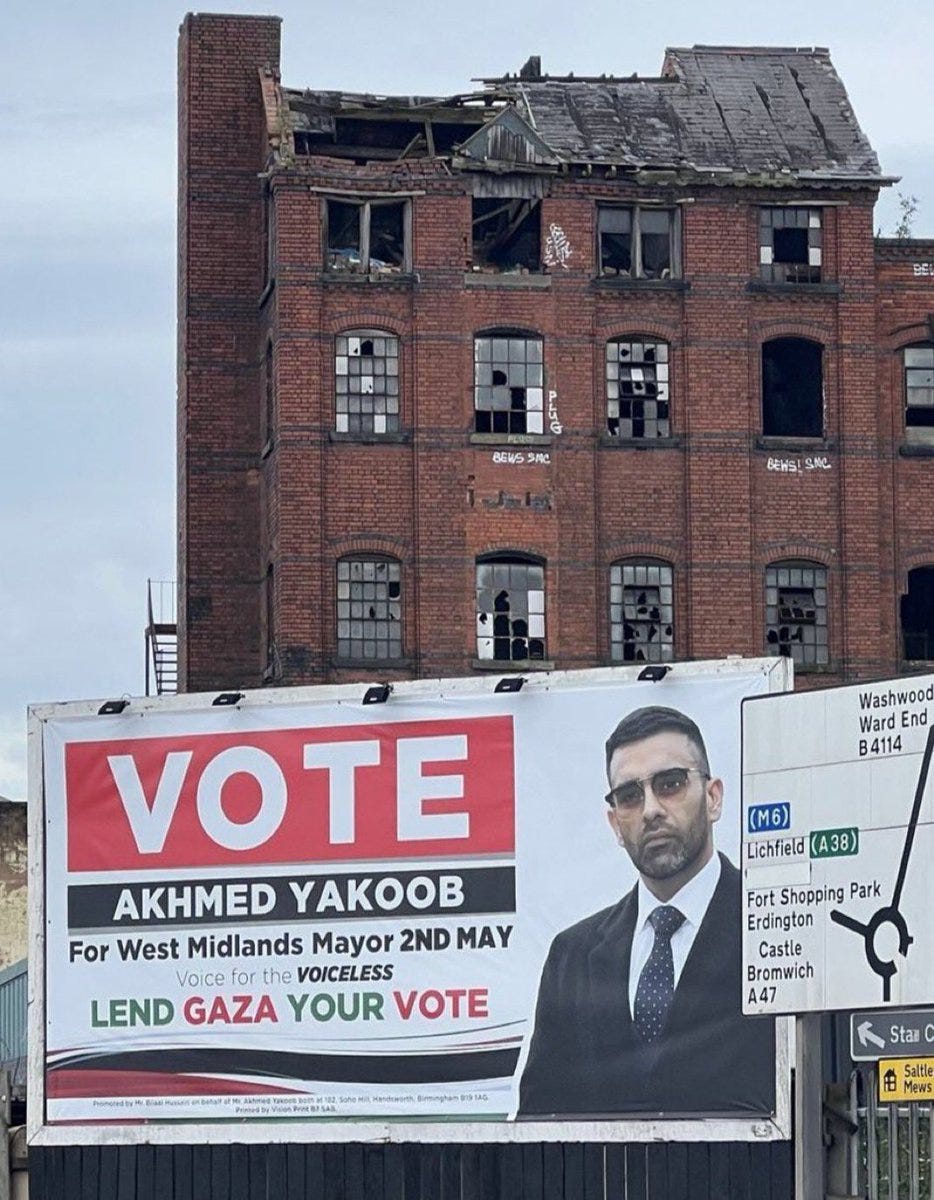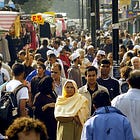What happened to Birmingham?
I returned to England's second city and was shocked by what I saw
Matt Goodwin’s newsletter goes to a community of 75,700 subscribers from 180 countries. Like our stuff? Then for the equivalent of buying us a pint each month become a paying supporter. Help us make a difference while gaining access to everything: the archive, exclusive posts, events, discounts, comments and most of all know that you’re supporting independent writers who are challenging the broken status-quo and giving voice to the Forgotten Majority. You can also join us on YouTube, Instagram, TikTok, Twitter/X and Facebook.
When I was a child, during the 1980s and 1990s, my brother and I lived with our single mother in Hertfordshire. But we also spent much of our childhood visiting our maternal grandparents in Birmingham, England’s ‘second city’, in the Midlands.
Our grandparents lived in a place called Castle Bromwich —a solidly working-class neighbourhood on the outskirts of the city. They knew all their neighbours. They went to church every weekend. And while their neighbourhood wasn’t affluent the locals did share a sense of pride in the place —I don’t remember any rubbish, crime, chaos.
When we weren’t kicking a football around their garden or visiting playgrounds they would take us into the city centre to visit the Bullring shopping centre and have a look around. I enjoyed it. I remember the place feeling vibrant, fun, and safe. And I remember how much pride they felt in Birmingham’s remarkable history and culture.
But that was a long time ago.
A couple of weeks ago, I returned to Birmingham for work. I’d not really been back to the city for twenty years or so and even then my visits had been fleeting, confined to Birmingham’s incredibly hectic New Street train station and the city centre.
So, this time, I took the opportunity to walk around and have a proper look. And, to be honest, I was completely and utterly shocked by what I saw.

The city, which declared itself bankrupt in 2023, was a mess.
The streets were filthy. The smell of drugs was constantly hanging in the air. Gangs of young people roamed the streets —on a Tuesday morning. I found the atmosphere oppressive and intimidating. I tried to imagine my 90-something grandmother walking home, alone, from church, as she used to do, but found it impossible.
Many people were visibly struggling. I was continuously asked for money, usually by people from the white working-class who were visibly addicted to Class-A drugs and whose gradual replacement in England’s second city was perhaps best symbolised by the countless hijab and keffiyeh scarfs, abayas, and more.
The city, in short, just looked completely lost.
It certainly did not resemble anything close to the city I remember from my childhood nor the version of Britain and England that I know and can relate to.
I found it very sad. I was genuinely shocked.
And I’m certainly not the first person to make these observations.
Last year, viral YouTuber Bald and Bankrupt also wandered around Birmingham, before the current bin strikes exacerbated many of the city’s problems, and pointed to the endless litter, barber shops, foreign mini-marts and rampant drug use.
As writer Will Lloyd later pointed out in the Times, these online travelogues, whereby bloggers turn up to one of England’s rapidly changing neighbourhoods and just film, mix the older tradition of travel writing found in George Orwell’s The Road to Wigan Pier and JB Priestley’s English Journey with the point-and-judge amorality of Benefits Street’s poverty porn and the unfiltered talking points of the nationalist scene.
But what I found most troubling in Birmingham isn’t just the litter, the city’s dire financial situation, or the spiralling crime (until very recently Birmingham had the highest rate of knife crime in England and Wales).
It was about —as I’m about to show you— the glaring lack of social integration, cohesion, and the very visible failure of what we might call ‘the diversity project’.
It’s about what happens when you simultaneously impose mass uncontrolled immigration and rapid demographic change on a country in a very short period of time, prioritise newcomers over locals, and fail to integrate local communities.
I’ve written before about what I think makes an integrated community. I think it’s a place where local authorities prioritise people who are from that place, especially when distributing scarce local goods, like social housing.
It’s a place where locals, in turn, contribute by working and paying tax so that their fellow neighbours and citizens can benefit from the same support, should they need it.
And it’s a place where people actively integrate into the wider community, not only by identifying with an over-arching identity but by speaking the national language.
This, at a minimum, is what I think is needed to cultivate an integrated society.
But when I looked around large parts of Birmingham —a city in which fewer than half of all residents are now white, nearly one in three are Muslim, the vast majority of social housing has gone to people who were not born in the UK, one in every seven openly reject a British or English identity, and more than one in five are living in households in which adults do not speak English as their main language—this is not what I saw or felt at all. Far from it.
What I saw was a social contract that is now just unravelling —a warning about what will happen to the rest of the country if we continue to pursue these extreme policies that are being imposed on us from above by an out-of-touch elite class.
So, building on our recent viral piece on the ten most broken places in Britain, I decided to look at the data on some of the neighbourhoods I was walking around. And what I found, as I’m about to show you, was deeply troubling.
This is a reader supported publication and platform. We cannot function without your support so if you’ve not upgraded consider doing so. If you are a military veteran, emergency worker or student e-mail us direct at matt@mattgoodwin.org and ask for the discount
Take, for example, the North Central and Dartmouth Circus area of Birmingham.
In this area, shockingly, nearly 70 per cent of all available social housing has gone to people who were not born in the UK, of whom only around half are actually working.
In fact, across this area only one in five people, according to the latest census, in 2021, are in employment compared to nearly six in ten people in England.
Only a little over half of the people in this area, 59 per cent, were born in the UK, compared to an average of 83 per cent across England, while more than one in four were born somewhere in the Middle East or Asia.
While only around one-quarter of people in this neighbourhood are white, reflecting the sheer pace of demographic change, what I find more concerning are people’s sense of identity and whether they can speak English.
In this area, more than 26 per cent of all people —more than one in four—say they only identify with a ‘non-UK identity’ only, nearly three times the average in England.
The largest single religious group in this area are Muslims, who represent close to one-third of the local population, while nearly 30 per cent of all households contain no adults who speak English as their main language, compared to 6 per cent in England.
Or look, too, at Lozells East, which at the last election is part of a seat that was won from Labour by one of the five ‘independent’ pro-Gaza MPs, Ayoub Khan.
Aside from taking this seat, the pro-Gaza campaigns that ran on explicitly sectarian lines, organising ‘Muslim votes’ and importing conflicts from abroad into domestic British politics, also reduced enormous Labour majorities across Birmingham.
And, no, these campaigns were not democratic.
As two leading female Labour MPs have warned, they saw threats to their personal safety, intimidation, and harassment. Is this the future of our democracy?
In this part of the city, too, the basic social contract that should underpin a healthy society is falling apart.
Nearly two-thirds of social housing has gone to people who were not born in the UK, of whom only 40 per cent are currently working and paying tax.
Only a little over one-third of people are in employment, while more than half are economically inactive, with the largest number saying they are looking after relatives.
Once again, only around half of the people in this part of Birmingham were born in the UK, with one-third born in the Middle East or Asia.
And look too at the remarkable demographic churn in areas like this.
Just 7 per cent of people here are White, compared to an average of 81 per cent in England, while 84 per cent are Asian or Black. More than two-thirds are Muslim and fewer than one in five are Christian. One in eight reject a UK-based identity. And only a little over half of all households contain adults who all speak English.
Or look at another area, Sparkbrook South, held by Labour MP Tahir Ali.
In this seat, nearly two-thirds of social housing, 64 per cent, has gone to people who were not born in the UK, of whom only one in three are currently working.
Only a little over half of people here were born in the UK, while close to one-third of all locals were either born in the Middle East or Asia.
Astonishingly, just 5 per cent of all people here, one in every twenty, are white, while close to three-quarters of the local population are Asian and 84 per cent are Muslim.
This was the area that saw, during the Southport riots and protests last year, the infamous attack on The Clumsy Swan pub where armed gangs waving Palestinian flags descended on a local pub searching for locals to assault.
While more than 15 per cent of people who live here reject any association with a UK identity, identifying instead with a ‘non-UK’ identity, fewer than half of the locals, just 40 per cent, live in households in which all adults speak English.
How can you integrate and cultivate a successful nation while large numbers of people reject its overarching identity and do not speak the national language?
Or, lastly, look at Ladywood Summer Hill, which sits within the seat that was almost won at the last election by Akhmed Yakoob —the now infamous pro-Gaza TikTok lawyer who just announced plans to “seize power” on Birmingham City Council by organising local Muslim candidates and running on explicitly sectarian lines.
In this area, too, more than half of all social housing has gone to people who were not born in the UK, of whom only around 43 per cent are currently in work.
Not even six in ten people who live here were born in the UK, while close to 30 per cent of locals disassociate themselves from a British or English identity.
I don’t want to pick on one city and without question there are parts of Birmingham that appear to be doing better than others.
But, seriously, I ask you, do these areas symbolise the successful, integrated, cohesive country that our political leaders talk about?
Does this look like what is needed to hold our nation together —a place where everybody pays their way, contributes to the collective pot, and are united around a shared sense of identity and language? Does this inspire you with hope and confidence about the future, about where the country is now heading?
Or do these areas, instead, symbolise the unavoidable failure of extreme policies that have been imposed on our country by an out-of-touch ruling class, policies which are now very clearly and visibly making way for segregation and sectarianism?
Even today, of course, we are not really allowed to point all this out and ask some tough questions about what is happening in modern Britain. We are just supposed to stay quiet, go along with it, and bow down before the altar of the new sacred religion of diversity. Well, I’m afraid I for one will keep asking some tough questions.
Because what I saw in Birmingham is very clearly not working —it’s to working at all. And the only thing I knew for sure as I travelled home on the train that day is that I’m actually glad my grandparents are not around to see it.













This was a hard read, I was in Birmingham city center yesterday. As a single young women I remember feeling so uneasy I just wanted to leave as soon as possible. May your grandparents rest in peace
Truly shocking Matt. However, I come from Leeds and I can see something very similar happening there too. The filth and rubbish on the streets makes it look like a third world country, there is no such thing as civic pride any more and there are places where I feel uneasy when walking around the city centre - in broad daylight never mind at night. I am very angry about this but there seems little that can be done lawfully. Maybe I just need to look after me and follow the wealthy to pastures new. I have no faith in any of our political parties - now including Reform UK. Just as bad as the rest.